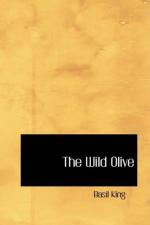“So should I,” he laughed. “What I’m to do when I’m turned adrift without you, Heaven only knows. It’s curious—the effect imprisonment has on you. It takes away your self-reliance. It gives you a helpless feeling, like a baby. You want to be free—and yet you’re almost afraid of the open air.”
He was so much at home with her now that, sitting carelessly astride of his chair, with his arms folded on the back, he felt a fraternal element in their mutual relation. She bent more closely over her work, and spoke without looking up.
“Oh, you’ll get along all right. You’re that sort.”
“That’s easy to say.”
“You may find it easy to do.” Her next words, uttered while she continued to flick color into her sketch, caused him to jump with astonishment. “I’d go to the Argentine.”
“Why not say the moon?”
“For one reason, because the moon is inaccessible.”
“So is the Argentine—for me.”
“Oh no, it isn’t. Other people have reached it.”
“Yes: but they weren’t in my fix.”
“Some of them were probably in worse.”
There was a pause, during which she seemed absorbed in her work, while Ford sat meditatively whistling under his breath.
“What put the Argentine into your head?” he asked, at last.
“Because I happen to know a good deal about it. Everybody says it’s the country of new opportunities. I know people who’ve lived there. The little girl I was speaking of just now—whom I’m so fond of—was born there. Her father is dead since then, and her mother is married again.”
He continued to meditate, emitting the same tuneless, abstracted sound, just above his breath.
“I know the name of an American firm out there,” she went on. “It’s Stephens and Jarrott. It’s a very good firm to work for. I’ve often heard that. And Mr. Jarrott has helped ever so many—stranded people.”
“I should be just his sort, then.”
His laugh, as he sprang to his feet, seemed to dismiss an impossible subject; and yet as he lay on his couch that evening in the lampless darkness the name of Stephens and Jarrott obtruded itself into his visions of this girl, who stood between him and peril because she “disliked the law,” He wondered how far it was dislike, and how far jealous pain. In her eagerness to buy the domestic place she had not inherited she reminded him of something he had read—or heard—of the wild olive being grafted into the olive of the orchard. Well, that would come in the natural course of events. Some fine fellow, worthy to be her mate, would see to it. He was not without a pleasant belief that in happier circumstances he himself might have had the qualifications for the task. He wondered again what her name was. He ran through the catalogue of the names he himself would have chosen for a heroine—Gladys, Ethel, Mildred Millicent!—none of them seemed to suit her. He tried again. Margaret, Beatrice, Lucy, Joan! Joan possibly—or he said to himself, in the last inconsequential thoughts as he fell asleep, it might be—the Wild Olive.




